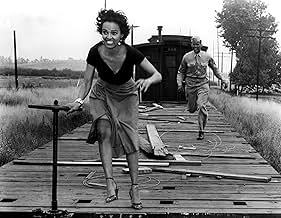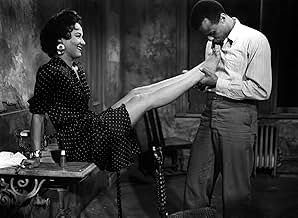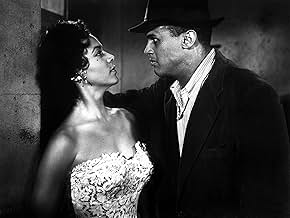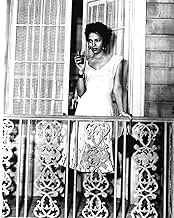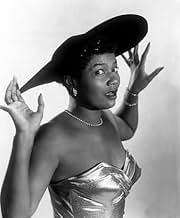Carmen Jones
- 1954
- Tous publics
- 1h 45m
IMDb RATING
6.7/10
6.2K
YOUR RATING
Contemporary version of the Bizet opera, with new lyrics and an African-American cast.Contemporary version of the Bizet opera, with new lyrics and an African-American cast.Contemporary version of the Bizet opera, with new lyrics and an African-American cast.
- Director
- Writers
- Stars
- Nominated for 2 Oscars
- 6 wins & 8 nominations total
Brock Peters
- Sergeant Brown
- (as Broc Peters)
LeVern Hutcherson
- Joe
- (voice)
- (as Le Vern Hutcherson)
Marilyn Horne
- Carmen Jones
- (voice)
- (as Marilynn Horne)
Marvin Hayes
- Husky Miller
- (voice)
Alvin Ailey
- Dance Soloist
- (uncredited)
DeForest Covan
- Trainer
- (uncredited)
Joseph E. Crawford
- Dink Franklin
- (singing voice)
- (uncredited)
Carmen De Lavallade
- Dance Soloist
- (uncredited)
Bernie Hamilton
- Reporter
- (uncredited)
Margaret Lancaster
- Singing Voice
- (uncredited)
- Director
- Writers
- All cast & crew
- Production, box office & more at IMDbPro
Featured reviews
Preminger filmed this very quickly -- 17 days, I'm told -- in real or real-looking locations in the South, in widescreen. He cast top African-American talent and dubbed most of the cast, even those who could sing, to heighten the operatic effect.
Dandridge and Belafonte must be one of the most spectacularly beautiful couples in all the movies, and they play out the juicy old melodramatic plot for all it's worth (though his lack of acting training shows). The Hammerstein lyrics are mostly brilliant, and the original Merimee story is cleverly transplanted to a different time and place. The film's main trouble is its inconsistency of style -- it lurches from melodrama to comedy to musical comedy to opera, sometimes within a couple of scenes. The acting styles go from natural to hyper depending on what kind of scene is being played, so nothing really hangs together. In the better musicals, the moment where dialogue turns into song is subtly handled, so you're not really aware of the transition from realism to fantasy, but here there are huge bumps from one style to the next.
Still, it's good over-the-top entertainment, and, as noted elsewhere, a respite from the underuse and mishandling of African-American talent on the screen. And it is, for its time, low on condescension and stereotypes.
Dandridge and Belafonte must be one of the most spectacularly beautiful couples in all the movies, and they play out the juicy old melodramatic plot for all it's worth (though his lack of acting training shows). The Hammerstein lyrics are mostly brilliant, and the original Merimee story is cleverly transplanted to a different time and place. The film's main trouble is its inconsistency of style -- it lurches from melodrama to comedy to musical comedy to opera, sometimes within a couple of scenes. The acting styles go from natural to hyper depending on what kind of scene is being played, so nothing really hangs together. In the better musicals, the moment where dialogue turns into song is subtly handled, so you're not really aware of the transition from realism to fantasy, but here there are huge bumps from one style to the next.
Still, it's good over-the-top entertainment, and, as noted elsewhere, a respite from the underuse and mishandling of African-American talent on the screen. And it is, for its time, low on condescension and stereotypes.
You may guess that I love Bizet's opera Carmen, it is somewhat tragic but very passionate. While updated, this film directed wonderfully by the talented Otto Preminger is a wonderful contemporary version of the opera, still maintaining Bizet's wonderful music and inspired lyrics from Oscar Hammerstein II. Whether it is the definitive film version of the opera I am not sure, I absolutely adore the 1984 film with Placido Domingo and Julia Mignes-Johnson. That aside, this film is really handsomely shot, with beautiful crisp cinematography and stunning scenery. And of course the music is outstanding "Dat's Love", "Dis Flower", "Stan' Up an' Fight" and "Dere's a Cafe on de Corner" really do stand out. The story is a beautiful, tragic, compelling one, not at all confusing. And the performances are marvellous, Dorothy Dandridge is superb as Carmen Jones. She is gorgeous, flirtatious and sexy, everything Carmen in the opera should be. Harry Belafonte does a great job as Joe, the man consumed for the passion of Carmen, so much so he is driven to murder. Olga James is heart breaking as Cindy-Lou, Pearl Bailey is a delightful Frankie, Joe Adams is a great Husky Miller and Brock Peters is effective as Sergeant Brown. I have heard complaints that the singing was awful, and I disagree completely. Marilyn Horne has a beautiful singing voice and she did well as Carmen. She has been better though, she has a much stronger voice than what was heard here. And LeeVern Hutcherson has a lovely tenor voice, quite lightweight and sensitive when it needs to be. And Marvin Hayes has a very resonant voice that is needed for his character. If the singing was a little quiet at times, do bear in mind sound and technology wasn't as good then than it is now. My real complaint was that the lip-synching was a little behind the singing at times, but other than that, this is a great film. 9/10 Bethany Cox
to see this amazing film. I thought Halle Berry did a great job in the Dandridge biopic, but after seeing Carmen Jones I don't know if she could do Dorothy justice. This woman was amazing in this film. she RADIATED sex appeal and I could see why her performance was groundbreaking. Otto Preminger directed and shot a beautiful film, and contemporary actors, especially black actors, should set the performances in this movie as highwater marks to shoot for. Pearl Bailey was amazing in addition to the two leads, Belafonte and Dandridge. Joe Adams as the boxer and the woman who played Cindy Lou also gave great performance.
Again to see black actors in this time period given a chance to perform a full range of characters was really amazing. In a lot of ways this film is more progressive than the drivel of black genre films coming out of Hollywood today
Again to see black actors in this time period given a chance to perform a full range of characters was really amazing. In a lot of ways this film is more progressive than the drivel of black genre films coming out of Hollywood today
This is the story of a soldier, Joe (Harry Belafonte) and a fiery lady, Carmen (Dorothy Dandridge) and their unlikely relationship which begins with Joe trying to transport Carmen to the brig...and ends up with the pair falling in love.
If you are looking to see a classic opera translated into more modern times and with entirely new lyrics, then "Carmen Jones" is definitely for you. However, regardless of its all-black cast, this is clearly a film that is for very select folks! You hate opera well then the film will be a tough sell! As for me, I would have enjoyed the music OR the story. The total package didn't hold my interest. But this does NOT mean the film is bad or poorly made...it's not. It's all a matter of personal taste.
If you are looking to see a classic opera translated into more modern times and with entirely new lyrics, then "Carmen Jones" is definitely for you. However, regardless of its all-black cast, this is clearly a film that is for very select folks! You hate opera well then the film will be a tough sell! As for me, I would have enjoyed the music OR the story. The total package didn't hold my interest. But this does NOT mean the film is bad or poorly made...it's not. It's all a matter of personal taste.
Even after the success of Oklahoma, the partnership of Rodgers&Hammerstein was not cast in stone yet. After Oklahoma debuted, Oscar Hammerstein, II went to work on his next Broadway show with a dead collaborator. He wrote new lyrics for the music of Georges Bizet's opera Carmen and wrote a new book for an all black cast to perform it, in the tradition of Porgy and Bess.
That show was Carmen Jones and it ran for 502 performances on Broadway from 1943 to 1945. Hammerstein discovered what the team of Robert Wright and Chet Forrest had previously found out in adapting Edvard Grieg's melodies into their hit, Strange Music. That there's nothing like writing with a collaborator who can't complain and who's melodies are already a hit.
In fact while the show was originally on Broadway, Rise Stevens had sung in Going My Way the song that eventually became Dat's Love. And Nelson Eddy and sung The Toreador Song in his film Balalaika. Hammerstein brilliantly capitalized on some free publicity for his own show.
Harry Belafonte and Dorothy Dandridge give great acting performances though it's kind of strange to hear other voices coming from the mouths of two good singers. Their voices weren't operatic though, yet the singers dubbing them matched well with the personalities of both the leads. And Dandridge had Marilyn Horne, you can't do much better than that.
The whole thing originates from the French novelist's Prosper Merimee's story of the ill effects of passionate love. Harry Belefonte's on his way to being a Tuskegee airman and he runs afoul of Carmen Jones. Belefonte's got himself a gal, but Dandridge puts on her Delilah routine and Belefonte's dead meat.
In addition to Samson and Delilah the Belefonte character is remarkably similar to George Hurstwood in Theodore Dreiser's Sister Carrie. Another man who threw it all away for passion. I wouldn't be surprised if Dreiser refined Merimee's theme.
But Dandridge's performance is the best. As the hedonistic Carmen Jones, she's a wonder on screen. Seeing her realize that part on the screen, we can well understand why Belefonte threw it all away for love. Dandridge became the first black woman nominated in the Best Actress category, but she lost the Oscar sweepstakes to Grace Kelly for The Country Girl.
For those who like the opera Carmen, I think they'll be well pleased with Oscar Hammerstein, II did with Bizet's music and Merimee's story.
That show was Carmen Jones and it ran for 502 performances on Broadway from 1943 to 1945. Hammerstein discovered what the team of Robert Wright and Chet Forrest had previously found out in adapting Edvard Grieg's melodies into their hit, Strange Music. That there's nothing like writing with a collaborator who can't complain and who's melodies are already a hit.
In fact while the show was originally on Broadway, Rise Stevens had sung in Going My Way the song that eventually became Dat's Love. And Nelson Eddy and sung The Toreador Song in his film Balalaika. Hammerstein brilliantly capitalized on some free publicity for his own show.
Harry Belafonte and Dorothy Dandridge give great acting performances though it's kind of strange to hear other voices coming from the mouths of two good singers. Their voices weren't operatic though, yet the singers dubbing them matched well with the personalities of both the leads. And Dandridge had Marilyn Horne, you can't do much better than that.
The whole thing originates from the French novelist's Prosper Merimee's story of the ill effects of passionate love. Harry Belefonte's on his way to being a Tuskegee airman and he runs afoul of Carmen Jones. Belefonte's got himself a gal, but Dandridge puts on her Delilah routine and Belefonte's dead meat.
In addition to Samson and Delilah the Belefonte character is remarkably similar to George Hurstwood in Theodore Dreiser's Sister Carrie. Another man who threw it all away for passion. I wouldn't be surprised if Dreiser refined Merimee's theme.
But Dandridge's performance is the best. As the hedonistic Carmen Jones, she's a wonder on screen. Seeing her realize that part on the screen, we can well understand why Belefonte threw it all away for love. Dandridge became the first black woman nominated in the Best Actress category, but she lost the Oscar sweepstakes to Grace Kelly for The Country Girl.
For those who like the opera Carmen, I think they'll be well pleased with Oscar Hammerstein, II did with Bizet's music and Merimee's story.
Did you know
- TriviaEartha Kitt was offered the role of Carmen, but the studio wanted her singing voice to be dubbed, so that her character would have an operatic voice. The same offer was made to Harry Belafonte and Diahann Carroll who accepted, but Kitt refused, wanting to use her natural voice. Dubbing was not required for Pearl Bailey, whose own voice suited her comedic songs.
- GoofsThe story takes place circa 1944, but all of the women's fashions and hairstyles are strictly 1954; when Carmen and Frankie are talking outside the Chicago Pawn Shop, 1950s-era automobiles passing by can clearly be seen reflected in the showcase window.
- Quotes
Carmen Jones: I always did want to see the big town.
Frankie: You got your wish, honey. Somethin' tells me Chicago's gonna be real good for you.
Myrt: Somethin' tells me you gonna be real *bad* for Chicago.
- Crazy creditsThe opening credits and end title are set around a flaming rose.
- ConnectionsFeatured in Small Steps, Big Strides: The Black Experience in Hollywood (1998)
- How long is Carmen Jones?Powered by Alexa
Details
- Release date
- Country of origin
- Language
- Also known as
- Oscar Hammerstein's Carmen Jones
- Filming locations
- Southern Pacific railroad crossing at 8746 E Los Angeles Avenue, aka California Highway 118, Moorpark, California, USA(scene where Carmen attempts escape from the Jeep)
- Production company
- See more company credits at IMDbPro
Box office
- Budget
- $750,000 (estimated)
- Runtime1 hour 45 minutes
- Color
- Aspect ratio
- 2.55 : 1
Contribute to this page
Suggest an edit or add missing content



